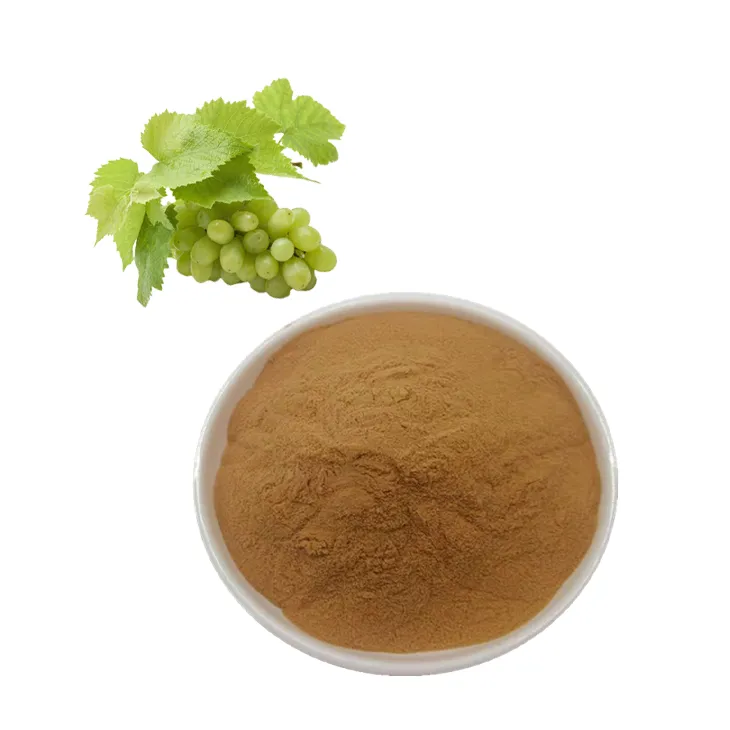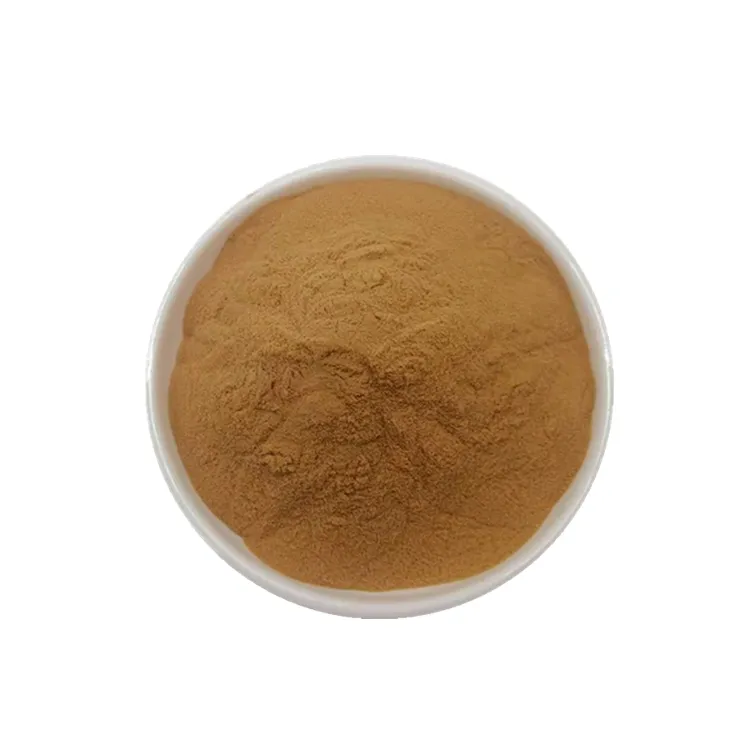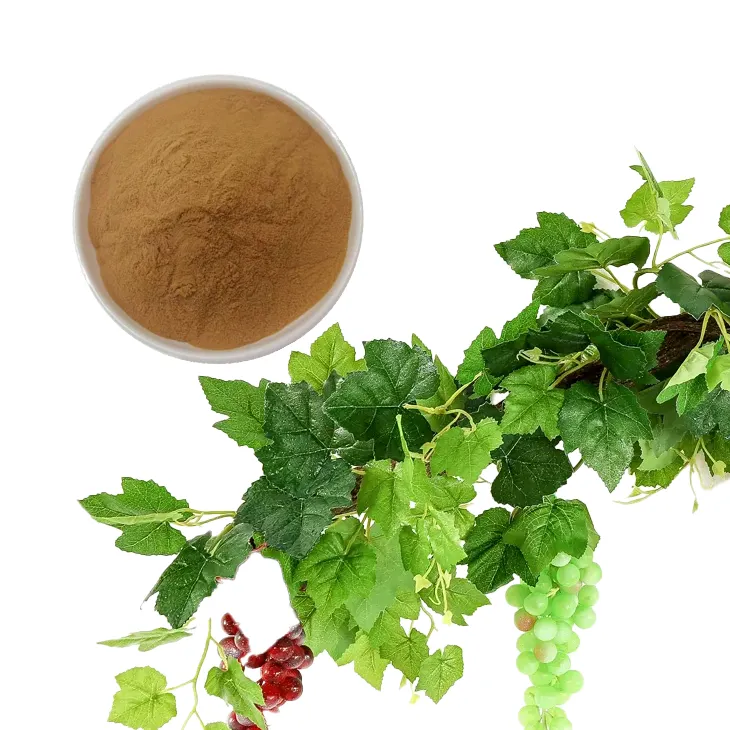- 0086-571-85302990
- sales@greenskybio.com
Benefits of Grape Leaf Extract in Cattle Feed.
2024-11-13

1. Introduction
In the realm of cattle farming, the search for effective and natural additives to enhance the quality of feed is an ongoing process. Grape Leaf Extract has emerged as a promising candidate with multiple benefits for cattle. This extract, derived from grape leaves, contains a variety of bioactive compounds that can positively impact the health and productivity of cattle.

2. Promoting Rumen Health
Rumen Fermentation Regulation The rumen is a crucial part of a cow's digestive system. Grape Leaf Extract plays a significant role in promoting rumen health, mainly through its ability to regulate the fermentation process in the rumen. In the rumen, microorganisms break down feed into various components for energy production. Grape Leaf Extract can optimize this process.
- It can influence the microbial population in the rumen. For example, it may encourage the growth of beneficial bacteria while suppressing the growth of harmful ones. This balanced microbial community is essential for efficient digestion.
- By regulating the fermentation process, grape leaf extract helps in more efficient energy production from feed. Cattle are able to extract more nutrients from the same amount of feed, which is beneficial for their growth and overall health.

3. Improving Reproductive Performance
Importance of Reproductive Performance Reproductive performance is a key factor in the long - term productivity of a cattle herd. Grape leaf extract has been shown to have a positive impact on this aspect.
- It may enhance the hormonal balance in cattle. Hormones play a crucial role in the reproductive cycle of cows. For instance, proper hormonal levels are required for regular estrus cycles, ovulation, and successful pregnancy.
- Grape leaf extract can also improve the overall health of the reproductive organs. This can lead to better fertility rates, reduced instances of infertility, and fewer problems during pregnancy and calving.

4. Antibacterial Effects
Maintaining a Healthy Digestive Tract The antibacterial effects of grape leaf extract are highly beneficial for cattle.
- In the digestive tract, there are numerous bacteria, some of which can be pathogenic. Grape leaf extract can combat these harmful bacteria, reducing the risk of infections. For example, it may inhibit the growth of bacteria such as Escherichia coli and Salmonella, which are common causes of digestive disorders in cattle.
- By maintaining a healthy balance of bacteria in the digestive tract, grape leaf extract helps in better nutrient absorption. A healthy digestive tract is more efficient at absorbing essential nutrients such as proteins, carbohydrates, and minerals, which are vital for the growth and development of cattle.
5. Nutrient Composition and Absorption
Rich in Nutrients Grape leaf extract contains various nutrients that can supplement the diet of cattle.
- It is a source of vitamins, such as vitamin C and some B - vitamins. Vitamin C can act as an antioxidant, protecting cells from oxidative damage. B - vitamins play important roles in metabolism, energy production, and nerve function in cattle.
- Additionally, grape leaf extract contains minerals like potassium and magnesium. Potassium is essential for proper muscle function and fluid balance in cattle, while magnesium is involved in bone development, enzyme activation, and nerve function.
- Some bioactive compounds in the extract can improve the permeability of the intestinal walls. This allows for better absorption of nutrients, ensuring that cattle get the maximum benefit from their feed.
- It can also interact with other feed components to make nutrients more available. For example, it may bind to certain minerals in a way that makes them easier to be absorbed by the intestinal cells.
6. Stress Resistance
Coping with Environmental Stress Cattle are often exposed to various environmental stresses, such as extreme temperatures, overcrowding, and changes in feed quality. Grape leaf extract can help cattle better cope with these stressors.
- It contains antioxidants that can neutralize free radicals produced during stress. Free radicals can cause damage to cells and tissues, and antioxidants in the grape leaf extract can prevent or reduce this damage.
- Grape leaf extract may also modulate the immune system of cattle. A strong immune system is crucial for cattle to resist diseases and infections that are more likely to occur during periods of stress.
7. Quality of Meat and Milk
Improving Meat Quality The addition of grape leaf extract to cattle feed can have a positive impact on meat quality.
- It can influence the fat composition in the meat. For example, it may lead to a more favorable ratio of unsaturated to saturated fats, which is beneficial for human health.
- Grape leaf extract can also affect the texture and flavor of the meat. Cattle fed with grape leaf extract - supplemented feed may produce meat that is more tender and has a better taste.
- It can increase the content of certain beneficial components in milk, such as immunoglobulins. Immunoglobulins in milk play an important role in providing passive immunity to newborn calves.
- Grape leaf extract may also improve the flavor of milk. This can be an advantage in the dairy industry, as consumers often prefer milk with a pleasant taste.
8. Sustainability and Cost - Effectiveness
Sustainable Source Grape leaves are a by - product in the grape - growing industry. Using grape leaf extract in cattle feed is a sustainable approach as it utilizes a resource that would otherwise be wasted.
- This not only reduces waste but also provides an additional income source for grape growers. They can sell grape leaves for extraction, which can be used in the cattle feed industry.
- Moreover, as the demand for natural and sustainable feed additives increases, grape leaf extract fits well into this trend, contributing to the overall sustainability of the livestock industry.
- Since it can improve the overall health and productivity of cattle, it can reduce the need for other more expensive treatments and additives. For example, if cattle have better rumen health and are less prone to diseases due to the use of grape leaf extract, farmers may save on veterinary costs and medications.
- The cost of producing grape leaf extract can be relatively low, especially when considering the large - scale availability of grape leaves as a by - product. This makes it an attractive option for cattle farmers looking to improve the quality of their feed without significantly increasing costs.
9. Future Research and Applications
Areas for Further Research Although grape leaf extract has shown many potential benefits for cattle feed, there are still areas that require further research.
- Optimal dosage determination is one such area. While initial studies have shown positive effects, more research is needed to establish the most effective and safe dosage levels for different types of cattle at different growth stages.
- Long - term effects of grape leaf extract on cattle health and productivity also need to be investigated. Understanding how continuous use of the extract over extended periods affects the overall well - being of cattle is crucial for its widespread adoption.
- It could be explored for its potential in reducing methane emissions from cattle. Methane is a significant greenhouse gas, and finding natural ways to reduce its production in cattle is of great interest in the context of environmental sustainability.
- Grape leaf extract may also have applications in improving the adaptability of cattle to different feed sources. This could be particularly useful in situations where traditional feed sources are scarce or expensive.
10. Conclusion
Grape leaf extract offers a range of benefits for cattle feed. From promoting rumen health and improving reproductive performance to having antibacterial effects and enhancing the quality of meat and milk, it has the potential to significantly improve the overall health and productivity of cattle. Additionally, its sustainability and cost - effectiveness make it an attractive option for the cattle farming industry. While further research is needed to fully understand and optimize its use, the current evidence suggests that grape leaf extract is a valuable addition to cattle feed.
FAQ:
1. How does grape leaf extract promote rumen health in cattle?
Grape leaf extract can regulate the fermentation process in the rumen. By influencing the microbial activities in the rumen, it helps in optimizing the breakdown of feed components. This leads to more efficient production of energy from the feed, which in turn promotes the overall health of the rumen.
2. What are the specific ways grape leaf extract improves cattle's reproductive performance?
The exact mechanisms are still being studied. However, it is believed that the nutrients and bioactive compounds in grape leaf extract might play a role in hormonal regulation and overall physiological well - being of the cattle. A healthy body condition supported by grape leaf extract may contribute to better reproductive functions such as improved fertility, successful gestation, and healthy offspring production.
3. Can you explain the antibacterial effects of grape leaf extract in more detail?
Grape leaf extract contains certain compounds that have the ability to inhibit the growth of harmful bacteria. These antibacterial agents may target specific bacterial cell structures or metabolic pathways, preventing the bacteria from multiplying. In the context of cattle, this helps in maintaining a healthy balance of the gut microbiota in the digestive tract, reducing the risk of diseases caused by pathogenic bacteria.
4. How much grape leaf extract should be added to cattle feed?
The appropriate amount of grape leaf extract to be added to cattle feed depends on various factors such as the age, weight, and physiological state of the cattle, as well as the composition of the existing feed. Currently, more research is needed to establish precise dosage guidelines. However, initial studies suggest starting with small amounts and gradually adjusting based on the observed effects on the cattle's health and performance.
5. Are there any potential side effects of using grape leaf extract in cattle feed?
So far, no significant side effects have been reported. But as with any new feed additive, continuous monitoring is essential. It is possible that in some cases, improper dosage or interactions with other feed components could lead to unforeseen effects. Therefore, further research is required to comprehensively understand all potential implications.
Related literature
- The Role of Plant Extracts in Ruminant Nutrition"
- "Beneficial Effects of Natural Extracts on Livestock Reproductive Performance"
- "Antibacterial Properties of Botanical Extracts in Animal Feed"
- ▶ Hesperidin
- ▶ citrus bioflavonoids
- ▶ plant extract
- ▶ lycopene
- ▶ Diosmin
- ▶ Grape seed extract
- ▶ Sea buckthorn Juice Powder
- ▶ Beetroot powder
- ▶ Hops Extract
- ▶ Artichoke Extract
- ▶ Reishi mushroom extract
- ▶ Astaxanthin
- ▶ Green Tea Extract
- ▶ Curcumin Extract
- ▶ Horse Chestnut Extract
- ▶ Other Problems
- ▶ Boswellia Serrata Extract
- ▶ Resveratrol Extract
- ▶ Marigold Extract
- ▶ Grape Leaf Extract
- ▶ blog3
- ▶ blog4
- ▶ blog5
-
Organic Tongkat Ali extract powder factory.
2024-11-13
-
How to make powder with ashwagandha extract.
2024-11-13
-
Rosehip extract manufacturers from China.
2024-11-13
-
The best cat's claw extract in nature.
2024-11-13
-
Chinese Dandelion Leaf Extract Suppliers.
2024-11-13
-
Elderberry Extract
2024-11-13
-
Lemon Juice Powder
2024-11-13
-
Eyebright Extract
2024-11-13
-
Pueraria Lobata Extract
2024-11-13
-
Hedyotis Diffusa Extract
2024-11-13
-
Honeysuckle Pollen
2024-11-13
-
Lemon Balm Extract
2024-11-13
-
Mulberry leaf Extract
2024-11-13
-
Green coffee bean Extract
2024-11-13
-
Alisma Extract
2024-11-13





















